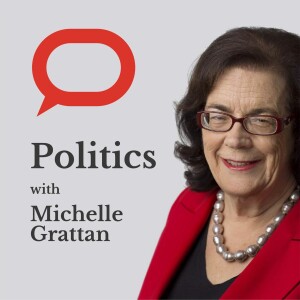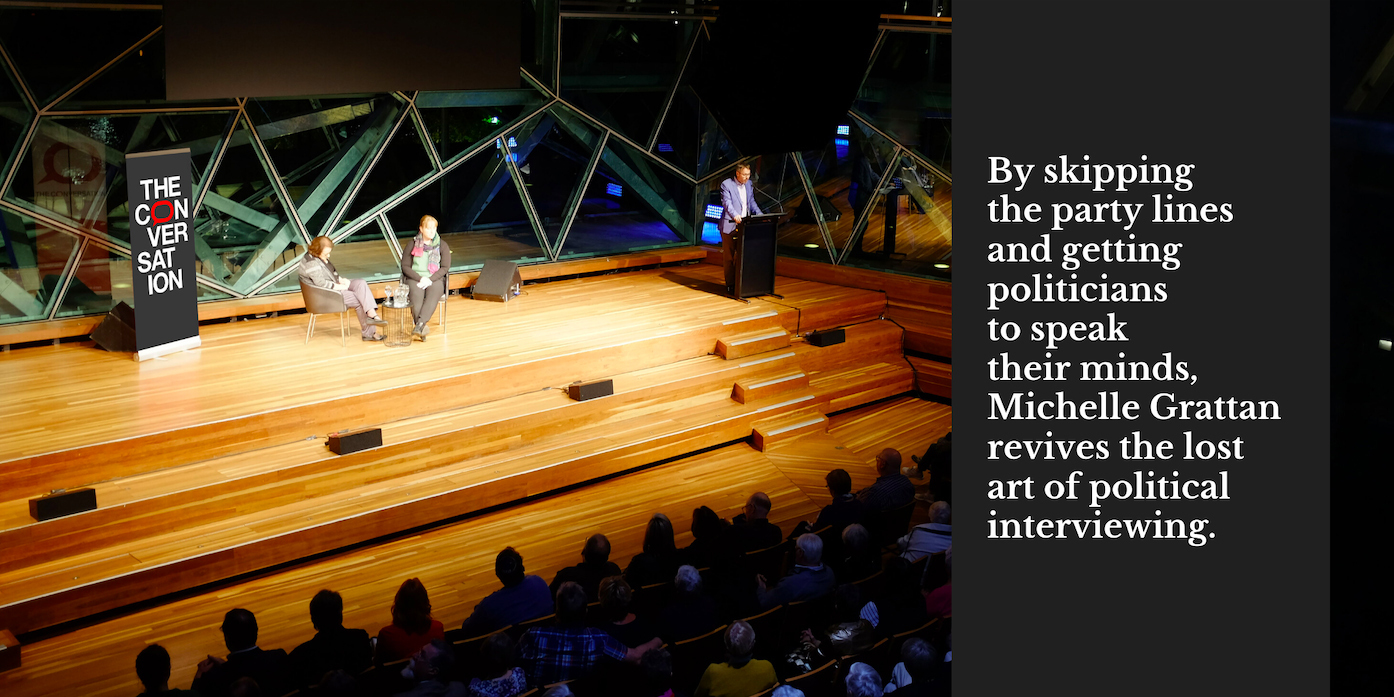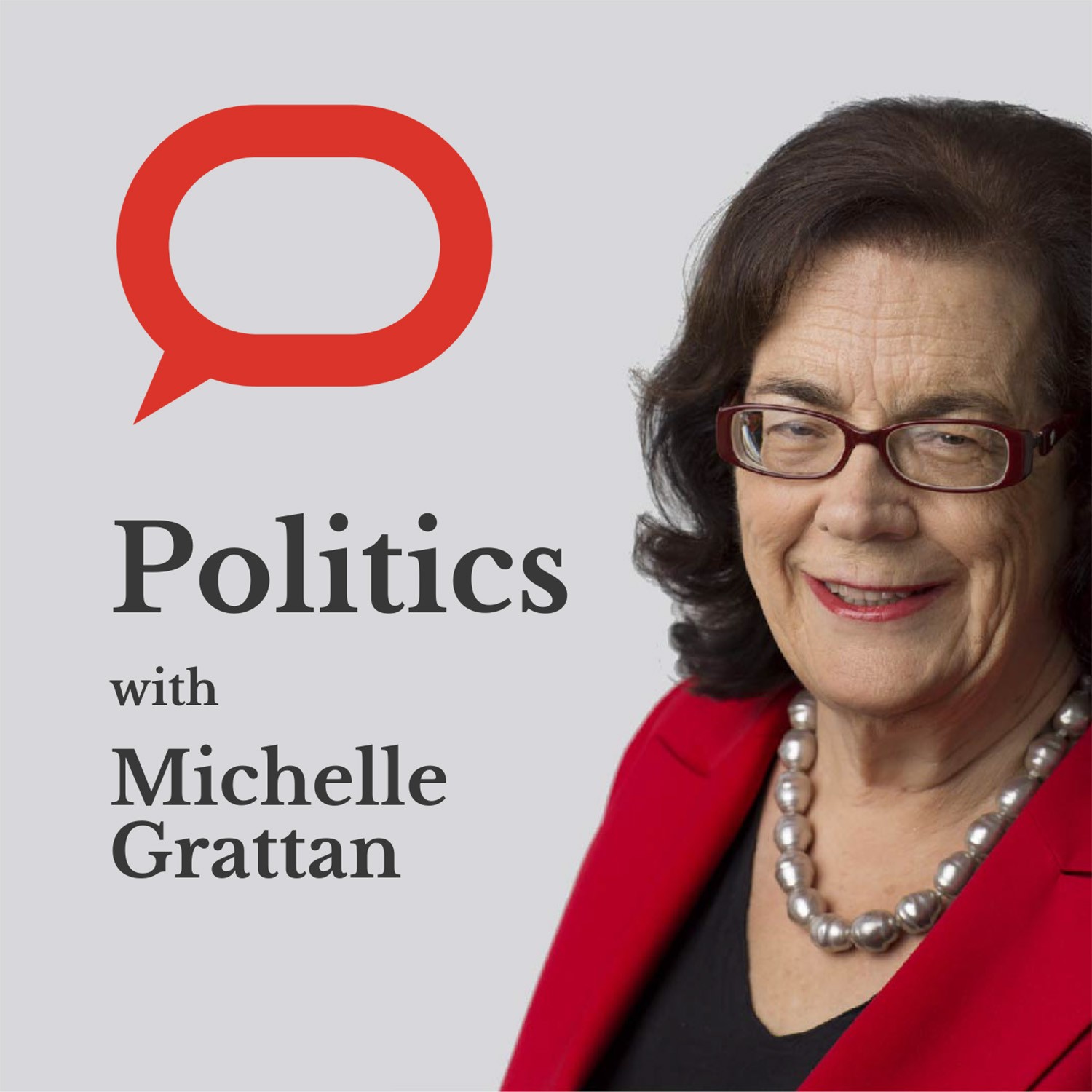Episodes

Tuesday Sep 21, 2021
Word from The Hill: The Furious French and Porter‘s fall
Tuesday Sep 21, 2021
Tuesday Sep 21, 2021
As well as her interviews with politicians and experts, Politics with Michelle Grattan now includes “Word from The Hill”, where she discusses the news with members of The Conversation politics team.
In this episode, politics + society editor Amanda Dunn and Michelle discuss the intense backlash from France over the Morrison government's AUKUS security deal with the United States and the United Kingdom, which will see Australia acquire nuclear-powered submarines and other sophisticated military technology. As well, they canvass the mounting international pressure on Scott Morrison as he and President Biden talk climate change during the PM's current US visit.
Michelle and Amanda also discuss Christian Porter's resignation from the ministry to the backbench after he refused either to find out names of donors who helped fund his defamation action or to give back the money.

Tuesday Sep 14, 2021
Word from The Hill: Christian Porter’s anonymous money pot
Tuesday Sep 14, 2021
Tuesday Sep 14, 2021
As well as her interviews with politicians and experts, Politics with Michelle Grattan now includes “Word from The Hill”, where she discusses the news with members of The Conversation politics team.
In this episode, politics + society editor Amanda Dunn and Michelle discuss Christian Porter’s extraordinary “blind trust” – where generous benefactors (assuming there’s more than one) are helping out with his legal bills in his now discontinued ABC defamation case. Porter, it seems, doesn’t know who he should be thanking because the donors are anonymous.
Amanda and Michelle also canvass Gladys Berejiklian’s on-again-off-again media appearances, and Scott Morrison’s trip to the US next week, which is likely to include some interesting exchanges with President Biden on climate policy.

Wednesday Sep 08, 2021
Kate Jenkins on the women‘s agenda
Wednesday Sep 08, 2021
Wednesday Sep 08, 2021
In the week of the National Summit on Women's Safety, Sex Discrimination Commissioner Kate Jenkins joins the podcast to discuss progress – and lack of progress – on issues of vital importance to Australian women.
Last week, the government passed aspects of Jenkins' Respect@Work report into law. Of the 12 recommendations which called for specific legislative reform, only six were enacted. In particular, the recommendation for placing a "positive duty" on employers to protect employees against workplace harassment has not been adopted. This cherry-picking has attracted considerable backlash.
Jenkins intends to continue pressing the government on the six unimplemented measures.
"When they gave their full response to the 55 recommendations in April [the government] did indicate they would do some legislative reform now and they would take longer to consider the other six."
"So they haven't said no to me right now, and I am going to hold them to their commitment that they will continue to consider those reforms."
The women's safety summit came when the conversation about this issue is front of mind, following marches early this year, sparked by the Brittany Higgins' allegation of rape in Parliament House, and the allegation of historical rape against Christian Porter, which he denies.
Jenkins says achieving gender equality is an issue in "many other Western countries" but Australia ranks 50th on the World Economic Forum Global Gender Gap Index.
"We started in 2006 at, I think it was, 15. So [...] other countries have been really moving at a faster pace than we have."
"We are world-leading in terms of [...] educating women and girls. So the problem does tend to arise once those women leave university, get streamed into lower paid jobs, get expected to stay at home, don't have access to good, flexible, affordable childcare. There's a whole range of things that then build up in the Australian community. And I think it's time we change that."

Tuesday Sep 07, 2021
Word from the Hill: A Father‘s Day backlash hits Scott Morrison
Tuesday Sep 07, 2021
Tuesday Sep 07, 2021
As well as her interviews with politicians and experts, Politics with Michelle Grattan now includes “Word from The Hill”, where she discusses the news with members of The Conversation politics team.
In this episode, politics + society editor Amanda Dunn and Michelle discuss the criticism Scott Morrison has already faced this week.
Firstly, his trip to Sydney to visit his family for Father's Day, which required a special exemption to return to Canberra, brought a sharp backlash when so many families couldn't reunite for the weekend. The PM didn't breach the rules – but did fail the pub test.
Secondly, while his address to the National Summit on Women's Safety acknowledged that "Australia has a problem" when it comes to ensuring women feel safe, critics including Australian of the Year Grace Tame are scathing of his and his government's performance.

Wednesday Sep 01, 2021
Word from The Hill: Learning to live with COVID
Wednesday Sep 01, 2021
Wednesday Sep 01, 2021
As well as her interviews with politicians and experts, Politics with Michelle Grattan now includes “Word from The Hill”, where she discusses the news with members of The Conversation politics team.
In this episode, politics + society editor Amanda Dunn and Michelle discuss the June quarter national accounts, released on Wednesday. While this quarter was better than expected, the September quarter is certain to be negative as a result of the prolonged lockdowns.
They also mark the change this week in the national COVID debate, as the Victorian government, following NSW, admits defeat in the battle to get to COVID zero.

Wednesday Sep 01, 2021
Pat Turner on COVID – and god botherers – stalking Indigenous communities
Wednesday Sep 01, 2021
Wednesday Sep 01, 2021
COVID has been spreading quickly in western NSW Indigenous communities where low vaccination rates and poor conditions make for a toxic mix. The first Indigenous death occurred in Dubbo this week.
As efforts intensify to deal with the NSW outbreak Pat Turner, CEO of the National Aboriginal Community Controlled Health Organisations (NACCHO) joins the podcast. As well as discussing the NSW situation, she warns of the vulnerability of communities in Western Australia, attacks religious figures promoting dangerous misinformation, and says Indigenous communities can't safely open at 70% or 80% vaccination rates.
On western NSW, where there are hundreds of cases, Turner says crowded and bad housing make it "almost impossible to isolate and quarantine". People in Wilcannia are "having to isolate in tents – in Australia in 2021".
In WA First Nations communities, the low vaccine coverage "is a very significant concern to all of us".
"It has by far the lowest uptake, with less than 10% of its population 12 years and over fully vaccinated".
"I would think that the first death for Aboriginal and Torres Strait Islander people [...] has been a wake up call for some, especially those who didn't think that COVID would affect them. The reality is sinking in for many of those."
One obstacle is the spread of false claims by god botherers.
"[Aboriginal] Pastor Geoffrey Stokes called out a circular that had been sent around by [a] so-called Indigenous prayer group in the goldfields of Western Australia. And it happened that it was a white bloke from Brisbane who had circulated the misinformation. So that was soon put to bed.
"But there are people and communities, Aboriginal communities that belong to groups like the Assemblies of God and, you know, other such religions that strongly believe that God will protect them."
"God will not stop COVID killing our people. I'm sorry to the religious leaders who believe that, but I'm telling them that will not happen."
While the national cabinet's plan provides for easing restrictions for the general community at 70% and 80% vaccination levels of those 16 and over, Turner insists that can't apply in Indigenous communities.
"No, no, no, 70 to 80% will not be good enough for our communities. We are aiming for 100% vaccination of Aboriginal and Torres Strait Islander people 12 years and over by the end of this year."

Wednesday Aug 25, 2021
Doherty’s Sharon Lewin on pivoting from chasing COVID zero
Wednesday Aug 25, 2021
Wednesday Aug 25, 2021
The Doherty modelling is the government’s underpinning for a proposed easing of COVID restrictions once we reach targets of 70% and 80% of the adult population vaccinated.
But the exit path has put Scott Morrison at odds with Western Australia and Queensland, states which would inevitably have to give up their present status of having little or no COVID.
The model’s priority is pivoting from reaching zero cases, to limiting COVID by vaccination, minimising serious illness, hospitalisation, and deaths.
This week, Professor Sharon Lewin, Director of the Peter Doherty Institute for Infection and Immunity joins the podcast to explain into the much-discussed modelling and its policy implications.
In the event things open up, our “first line of defence” will be the public health capacity, says Lewin. The ability to trace, test, isolate, and quarantine limits the explosion of cases and keeps the transmission potential “less than one”.
Some critics have said the 70-80% target won’t sufficiently protect the entire population from COVID. Lewin notes that amongst the varying models there is agreement we cannot open up on vaccine uptake alone.
“You can’t just open up a 70% with nothing else in place. There is no ‘Freedom Day’. You do need these additional public health measures.”
In particular, while “tremendous advances have been made in capabilities[…] it’s not universal across the country. In particular, First Nation communities, which have been prepared and boasted an "effective community lead response” earlier in the pandemic, will require a strengthening of their public health facilities.

Tuesday Aug 24, 2021
Word from the Hill: The battle to exit COVID
Tuesday Aug 24, 2021
Tuesday Aug 24, 2021
As well as her interviews with politicians and experts, Politics with Michelle Grattan now includes “Word from The Hill”, where she discusses the news with members of The Conversation politics team.
In this episode, politics + society editor Amanda Dunn and Michelle discuss the frictions as vaccination rates rise and the debate turns to lifting lockdowns and border restrictions. They also canvass the Morrison government's modest promise on Afghan refugees, and crossbencher Craig Kelly's announcement he'll lead Clive Palmer's United Australia Party at the election.

Wednesday Aug 18, 2021
Word from The Hill: Was the Afghanistan War worth it?
Wednesday Aug 18, 2021
Wednesday Aug 18, 2021
As well as her interviews with politicians and experts, Politics with Michelle Grattan now includes “Word from The Hill”, where she discusses the news with members of The Conversation politics team.
In this episode, politics + society editor Amanda Dunn and Michelle discuss the lost war in Afghanistan, as Australia tries to secure the evacuation of its citizens and Afghans who assisted the Australian Defence Force. They also canvass the government's hard line towards Afghans who came to Australia by boat and are on temporary protection visas.

Tuesday Aug 17, 2021
Anthony Albanese says Afghans in Australia should be given permanent residency
Tuesday Aug 17, 2021
Tuesday Aug 17, 2021
Graphic pictures of mayhem confront the world as desperate Afghans attempt to flee their country, after the Taliban's seizure of Kabul.
Australia's moral responsibly to evacuate people who assisted the Australian Defence Force, and may now face Taliban retribution, has become an important part of our exit from this lost war.
The government is mounting a rescue mission for some of these people, as well as for Australians still in the country. But speaking on the podcast, Anthony Albanese describes the government's effort as "the latest example of too little, too late".
Meanwhile, in Australia at present there are more than 4,200 Afghan refugees on temporary visas. Foreign Minister Marise Payne said on Tuesday that "at this stage" no visa holder will be asked to return to Afghanistan. Scott Morrison said the government "had no plans" to return any of these people.
Albanese says the government should give them permanent residency.
"The idea that people, for example many of whom are Hazaras, are on temporary protection visas - the idea that the circumstances are going to change, that these are temporary circumstances - is just not real" Albanese says.
"It doesn't acknowledge the circumstances which these people confront. And we want them to fully participate in Australian society, and they should have the capacity to become full Australian citizens."

